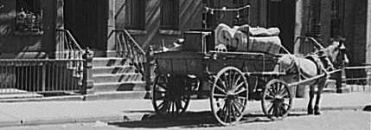Written 29 BCE
[All of Aristaeus' bees have died, so he goes to Proteus, a seer, and asks himforhelp. Proteus' reply follows. —Scott]
'Doubt not 'tis wrath divine that plagues thee thus,
Nor light the debt thou payest; 'tis Orpheus' self,
Orpheus unhappy by no fault of his,
So fates prevent not, fans thy penal fires,
Yet madly raging for his ravished bride.
She in her haste to shun thy hot pursuit
Along the stream, saw not the coming death,
Where at her feet kept ward upon the bank
In the tall grass a monstrous water-snake.
But with their cries the Dryad-band her peers
Filled up the mountains to their proudest peaks:
Wailed for her fate the heights of Rhodope,
And tall Pangaea, and, beloved of Mars,
The land that bowed to Rhesus, Thrace no less
With Hebrus' stream; and Orithyia wept,
Daughter of Acte old. But Orpheus' self,
Soothing his love-pain with the hollow shell,
Thee his sweet wife on the lone shore alone,
Thee when day dawned and when it died he sang.
Nay to the jaws of Taenarus too he came,
Of Dis the infernal palace, and the grove
Grim with a horror of great darkness—came,
Entered, and faced the Manes and the King
Of terrors, the stone heart no prayer can tame.
Then from the deepest deeps of Erebus,
Wrung by his minstrelsy, the hollow shades
Came trooping, ghostly semblances of forms
Lost to the light, as birds by myriads hie
To greenwood boughs for cover, when twilight-hour
Or storms of winter chase them from the hills;
Matrons and men, and great heroic frames
Done with life's service, boys, unwedded girls,
Youths placed on pyre before their fathers' eyes.
Round them, with black slime choked and hideous weed,
Cocytus winds; there lies the unlovely swamp
Of dull dead water, and, to pen them fast,
Styx with her ninefold barrier poured between.
Nay, even the deep Tartarean Halls of death
Stood lost in wonderment, and the Eumenides,
Their brows with livid locks of serpents twined;
Even Cerberus held his triple jaws agape,
And, the wind hushed, Ixion's wheel stood still.
And now with homeward footstep he had passed
All perils scathless, and, at length restored,
Eurydice to realms of upper air
Had well-nigh won, behind him following-
So Proserpine had ruled it—when his heart
A sudden mad desire surprised and seized —
Meet fault to be forgiven, might Hell forgive.
For at the very threshold of the day,
Heedless, alas! and vanquished of resolve,
He stopped, turned, looked upon Eurydice
His own once more. But even with the look,
Poured out was all his labour, broken the bond
Of that fell tyrant, and a crash was heard
Three times like thunder in the meres of hell.
'Orpheus! what ruin hath thy frenzy wrought
On me, alas! and thee? Lo! once again
The unpitying fates recall me, and dark sleep
Closes my swimming eyes. And now farewell:
Girt with enormous night I am borne away,
Outstretching toward thee, thine, alas! no more,
These helpless hands.' She spake, and suddenly,
Like smoke dissolving into empty air,
Passed and was sundered from his sight; nor him
Clutching vain shadows, yearning sore to speak,
Thenceforth beheld she, nor no second time
Hell's boatman brooks he pass the watery bar.
What should he do? fly whither, twice bereaved?
Move with what tears the Manes, with what voice
The Powers of darkness? She indeed even now
Death-cold was floating on the Stygian barge!
For seven whole months unceasingly, men say,
Beneath a skyey crag, by thy lone wave,
Strymon, he wept, and in the caverns chill
Unrolled his story, melting tigers' hearts,
And leading with his lay the oaks along.
As in the poplar-shade a nightingale
Mourns her lost young, which some relentless swain,
Spying, from the nest has torn unfledged, but she
Wails the long night, and perched upon a spray
With sad insistence pipes her dolorous strain,
Till all the region with her wrongs o'erflows.
No love, no new desire, constrained his soul:
By snow-bound Tanais and the icy north,
Far steppes to frost Rhipaean forever wed,
Alone he wandered, lost Eurydice
Lamenting, and the gifts of Dis ungiven.
Scorned by which tribute the Ciconian dames,
Amid their awful Bacchanalian rites
And midnight revellings, tore him limb from limb,
And strewed his fragments over the wide fields.
Then too, even then, what time the Hebrus stream,
Oeagrian Hebrus, down mid-current rolled,
Rent from the marble neck, his drifting head,
The death-chilled tongue found yet a voice to cry
'Eurydice! ah! poor Eurydice!'
With parting breath he called her, and the banks
From the broad stream caught up 'Eurydice!''
Source: Virgil. The Georgics. Trans. James Rhoades. The Internet Classics Archive (29 September 2000). http://classics.mit.edu/Virgil/georgics.4.iv.html. Accessed 15 December 2002.
